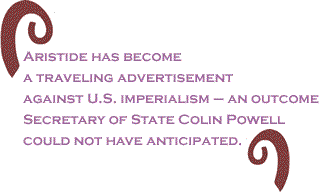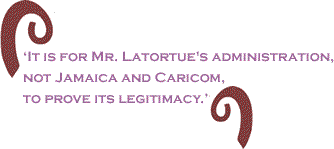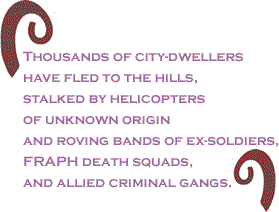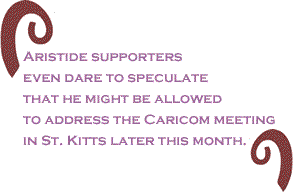
|
|||||||||||||||||||||
|
“Henceforth, the Haitian authorities will not allow other countries to trample upon the rights of Haitians,” huffed Gerard Latortue, the erstwhile South Florida “consultant” and talk show host installed as Prime Minister by foreign soldiers and homegrown gangsters who were at that very moment snuffing out the rights and lives of Haitians. Latortue on Monday executed his first grand act of international diplomacy by severing diplomatic ties with Jamaica and suspending membership in the Caribbean Community and Common Market (Caricom) in protest of deposed President Jean-Bertrand Aristide’s extended visit to Jamaica. Jamaican Foreign Minister K.D. Knight promptly shot back that “Jamaica has not recognized the interim Government of Haiti, as this will be the subject of deliberations by the Caricom Heads of Government at their Inter-Sessional Meeting in St. Kitts later this month.” The Jamaica Observer reminded the upstart that “it is for Mr. Latortue's administration, not Jamaica and Caricom, to prove its legitimacy.” Latortue then named a cabinet without a single representative of Lavalas, the political grouping that commands the allegiance of a majority of Haitians. "This government has no political attachment," Mr. Latortue said - an admission that it has no political base, which is fine with the Americans, who swore their puppet in as Prime Minister Wednesday night.
Meanwhile, the ever-splintering micro-parties fielded by Haiti’s tiny elite fought gun battles among themselves for the privilege of an audience with Guy Philippe, the U.S-armed warlord, who is touring the country cementing alliances and executing opponents. Haiti is a gangster state – if it can be called a state at all. Latortue’s presumption that he will rule for two years before elections are held – “We want not to go fast, but to take time” – is beyond farce. If the United States and France actually intended to install a functional government to replace the kidnapped and exiled Aristide, they have shown no evidence of it. Mad killers run amuck in the capital, Port-au-Prince, where the morgue overflows with decomposing bodies. The US-led multinational force and the police bear down exclusively on Aristide supporters. "There's a lot of them" to be arrested, said Leon Charles, the newly appointed police director general. What about the lawless “rebels” that came to town with Guy Philippe? “The government has to make a decision about the rebels. That's over my head,” said Charles. Pure terror
Beyond the rich neighborhoods of the capital, where the corporate press congregate, all Haiti is a killing field. “In Cap Haitian you have the former Haitian military. There are no police any more, so they are the ones who are law,” said Jean Charles Moise, mayor of the neighboring district of Milo. “They come into your home. They take you, they beat you up, they kill you. They burn down homes. They do anything they want, because they are the only law in town,” Moise told Pacifica Radio KPFA’s Flashpoints. “We have people like myself, mayors and other members of the municipal government who have had to flee and are now sleeping in the woods, and have gone to the mountains." Another Moise, Gonaives Mayor Taupa Moïse, was kidnapped on Sunday and held for $100,000 ransom. Thousands of city-dwellers have fled to the hills, stalked by helicopters of unknown origin and roving bands of ex-soldiers, FRAPH death squads, and allied criminal gangs. No one even ventures a guess as to the death toll. U.S. Ambassador James B Foley, the real civilian power in the Haiti, growled threats at Jamaica for extending hospitality to Aristide. “There is negative potential, there's no denying that," said Foley, standing beside U.S. Joint Chiefs of Staff chairman Gen. Richard B. Myers. “It must be said that Jamaican authorities are taking a certain risk and a certain responsibility.” The wake-up coup
'”It seems that they are more concerned with Aristide sitting in Jamaica than the thugs and murderers running around,” said Aristide lawyer Ira Kurzban, in Kingston, part of a delegation that flew from Miami to welcome the President back to the Caribbean after his ordeal in the Central African Republic.
TransAfrica founder Randall Robinson and his wife, Hazel Ross-Robinson, an advisor to Aristide, reside in St. Kitts. In an article for the Jamaica Observer titled, “Haiti, a wake-up call for us all,” Ms. Robinson wrote:
The Bush regime calls words such as these dangerous provocations. Yet every informed citizen of the Caribbean knows that Ross-Robinson’s statement is a perfect reflection of Caricom’s (and the Organization of American State’s) fundamental principles – of which the U.S. is in outrageous violation. "We don't recognize the new government of Haiti. The president of Haiti is called Jean-Bertrand Aristide, who was elected by his people,” declared Venezuelan President Hugo Chavez, survivor of a U.S.-backed coup less than two years ago. “Venezuela's doors are open to President Jean-Bertrand Aristide.” Democratic bagmen for Bush Thanks to the vigilance and leadership of Congressional Black Caucus members Maxine Waters (CA), Barbara Lee (CA), John Conyers (MI) and Charles Rangel (NY), the Haiti coup may yet mark a watershed in African American and Democratic Party politics. Documents obtained by freelance journalist Jeremy Bigwood show the U.S. funneled over a million dollars to coup plotters in Venezuela and Haiti through the National Endowment for Democracy. Britain’s Independent news reports:
In both Haiti and Venezuela, the opposition have all the “political space” they need, through control of the media and commerce. Out of power, Aristide has become a traveling advertisement against U.S. imperialism – an outcome Secretary of State Colin Powell could not have anticipated when he orchestrated the ex-priest’s journey into Central African “oblivion” less than three weeks ago. |
March
18
2004 |
|||||||||
|
|||||||||
|
|
|||||||||
| Printer Friendly Version | |||||||||
 |
|||||||||
| |
|||||||||
| |
|||||||||





























